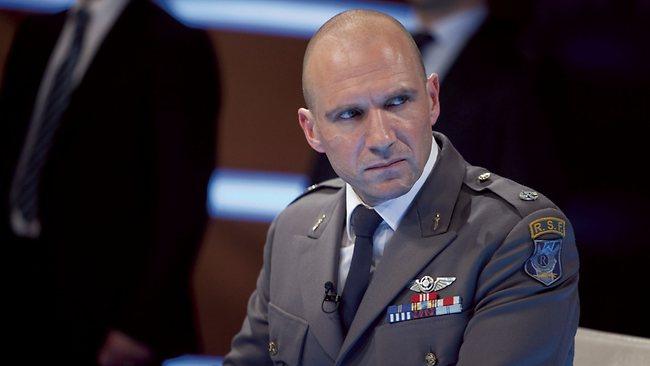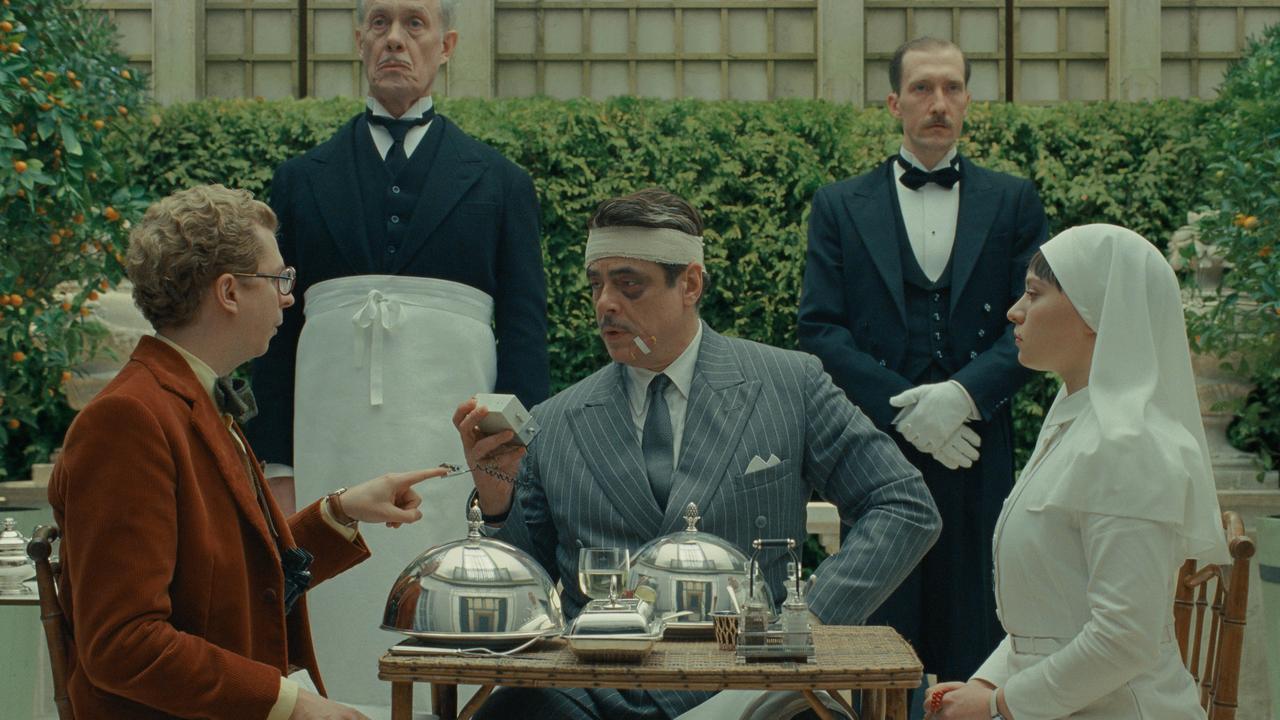Ralph Fiennes peers outside the hurt locker for Coriolanus
RALPH Fiennes talks about his musular and propulsive version of Shakespeare's core play Coriolanus, updated to here and now.

RALPH Fiennes has impeccable timing. It's hard to think of a more apt moment following the popular turmoil of 2011 - the Arab Spring and the Occupy movements - to direct and star in a film of Shakespeare's most stridently political play, Coriolanus.
And just a few days after our interview, the 49-year-old powerhouse of stage and screen is set to appear alongside British Prime Minister David Cameron on The Andrew Marr Show. As it turns out, Fiennes's stint will be low-key, and all but dwarfed by the presence of Cameron and a flurry of interest in big bonuses for people working in the City. But for now, over a shared pot of tea, politics is high on the agenda.
As you might reasonably expect, Fiennes has never voted Tory. And he's not about to start. "I always feel innately disappointed by politicians. I mean, I've never voted Conservative. I've voted Labour, and in the last election I voted Lib Dem." He says the latter ballot was a reaction against former prime minister Tony Blair and the war in Iraq, and then he adds, "I think the coalition is good for the energy of British politics. It's broken the two-party ping-pong, and it's good to have this kind of tension to it."
Fiennes, who is famed for playing the intensity in characters as varied as Voldemort in the Harry Potter franchise, Almasy in The English Patient and Amon Goeth in Schindler's List, sips his tea thoughtfully. He is dressed in a brown zippy cardy, in blue denims, and in expensive-looking brown leather ankle boots. I will later ask him if he ever splurges his blockbusting earnings on himself.
He flinches at the thought, and then says deadpan that he doesn't own a Harley Davidson, and that cars don't interest him, but that he does have an iPad, only his iPad - and this is very Ralph Fiennes - has no apps. "I use it just for cross-referencing scheduling, for addresses and for the constant flow of emails," he says, before adding that having money means he can "eat out in restaurants, and go on a holiday that might be on the higher end of the price range, and not have the anxiety of, 'F. . .! I've got to pay this off' ". Instinctively shy, his default setting is a tortured, kind of, handsome anxiety (think The Constant Gardener). Yet this is not to be confused, as many profilers do, with froideur. Instead, Fiennes gives every question, no matter how trivial, his complete and searing attention (the full Fiennes, if you like).
I have interviewed him three times, and have found that he'll discuss anything, with openness and seriousness, as long as it's not the intimate details of his sex life. For instance, when I ask him about the possibility of having children, he responds, chuckling and teasing, "Well, it might happen! But it's not something that I'm considering right now [he is currently single]. But, never say never!" Or on turning 50 later this year he grins and says, "I like getting old. It's kind of curious to see that you're heading to all the places you've seen people go before you. I'll be at that place where when I saw so-and-so hitting 50 I thought, 'God, they're getting on a bit'."
For now though, it's all about Coriolanus. The film is something close to a triumph. Muscular and propulsive, it takes the core Shakespearean tale - a general (Fiennes) is persuaded to enter politics by his mother Volumnia (Vanessa Redgrave) against his better instincts, when he'd much rather be out battling his mortal enemy Aufidius - and reboots it into the modern day Balkans, and shoots it with a jittery Hurt Locker-style energy (both films use Barry Ackroyd as cinematographer). It's politically resonant, visually stylish, and brimful of peerless performances. Even Gerard (300) Butler does proper acting here as Aufidius.
Making it, however, was a different story. Impossibly ambitious for a debut director, it was shot in and around Belgrade, on a budget of pound stg. 5.2 million ($7.7m) and over 10 helter-skelter weeks. Fiennes, who had been mulling the idea of directing for nearly a decade, says the filming process was a case of daily practicalities wrestling with overwhelming self-doubt. "There were days when I thought, 'I haven't got the right performance that I should be giving but I haven't got time, and I have to move on!' And then, the pressure on the head." (He presses his skull dramatically from both sides, as if trying to squeeze it like a pimple.) "Got to move on! And even if you think, 'F. . .! F. . .! F. . .! you can't afford to show it . . . And then later, you look at the rushes and you think that it's all shit. And then, thankfully, you learn the magic of editing."
The primal allure of the film, though, is in Fiennes's fulminating central turn as the man who refuses to bend to the base urges of the people. Isn't there something autobiographical in that? Someone dedicated to his craft who nonetheless has to play the publicity game for the sake of that craft? "I think there's a bit of me in there, sure," he begins, before explaining that it's all about masks, and that Coriolanus resents having to wear one, and that masks are strange, because he wears one all the time as an actor, and that, "sometimes, with acting, you reveal more about yourself in performance than you do in real life".
So what mask are you wearing right now? "Ugh," he groans. "I don't want to analyse the mask I'm wearing now! I try not to have them in real life, but you know?"
The real-life Fiennes began wearing masks, one suspects, at a young age. The eldest of six children born to writer Jennifer Lash and farmer-turned-photographer Mark Fiennes, he is the product of a bohemian and famously peripatetic childhood - from Dorset to Suffolk to West Cork to Salisbury to Wiltshire to London, moving house 14 times in 15 years. This creative yet cash-strapped childhood is something Fiennes and his siblings (including actor brother Joseph and director sisters Sophie and Martha) consistently return to, but his are often the toughest and least sentimental reflections. Today, for instance, he recalls, "My parents were very open about what worried them. And I can still hear my mother saying, 'You don't understand, your father is so overdrawn!' And you get that a few times and you start taking on the anxiety of the parents."
His mother, inevitably, was the big influence, and nudged him towards acting with a love of Shakespeare that would eventually lead him to the Royal Academy of Dramatic Art and beyond. But she also revealed to him the tortured nature of the truly artistic life.
"She was often frustrated and couldn't write," he says. "And when she did write it was a huge struggle for her. She carried her own demons from her own childhood. As her children we were in the frontline of her pain."
Fiennes says that being the eldest made things different for him, perhaps more angsty. And certainly his younger brother Joseph (and Joseph's twin Jacob, now a gamekeeper) had a "different experience altogether" of family life. And maybe it's being too literal, but it's instructive nonetheless to watch the differences between Joseph and Ralph on screen today, and to recognise in one the carefree mien of the youngest and in the other the lifelong simmerings of frontline pain.
But back to reality, and to masks, and to Fiennes's latest top-secret role, in the new Bond movie Skyfall. I've heard that he's playing the new M and that Judi Dench is to be bumped off. True? He laughs, and then recites a kind of rhymey response that feels suspiciously well-rehearsed. "My answer to that is, 'All this speculation, it's classified information!' Hahaha!"
We then do some chatting. He asks me lots of questions, about my life, my wife, my children and my work. It gets a bit matey. Which seems like as good a time as any to bring up the inescapable and numerous rumours about Fiennes's personal life, which have dogged the actor since he left his wife, ER and latterly Doctor Who star Alex Kingston, for actress Francesca Annis in 1996. Those "Romping Ralph" news stories about four-in-a-hot-tub sessions in a Belgian hotel during the shooting of In Bruges, or a mile-high encounter with a Qantas flight attendant during a flight to India in 2007 (widely believed to have been the reason for the end of his relationship with Annis). So, I say, you must get a lot of female attention? He laughs nervously. I press on. Do you find, actually, that women throw themselves . . .
"I don't really want to go where I think this question is going," he says, suddenly, smiling benignly. I just thought that . . . "No, I don't want to at all," he interrupts, still smiling.
We stay stuck like that for a bit. Him smiling. Me silent. Where do we go from here? He stays smiling, but nods down to my question sheet. Good idea. It takes only seconds, and we're back on track. His new film as a director will be the Dickensian drama The Invisible Woman, though it's not officially announced yet. He's pleased that being a filmmaker has allowed him to "step outside the label of being an actor". And, on ageing, he got his first pair of glasses two months ago. He says that, as he gets older, he gets more picky with his film roles, and the good roles are scarcer.
I end by asking him what keeps him awake at night and he answers, with those plaintive Ralph Fiennes eyes on full beam, "It's always anxiety. Something not done. Something I failed to do. Worry about accepting a part. Someone I've let down . . ."
His publicist says that we must end this now, because it could go on for ever. She's talking about the interview. But, you suspect, she might mean the list of anxieties.
The Times
Coriolanus opens on March 8.


